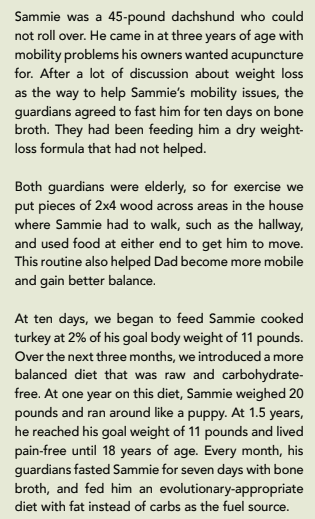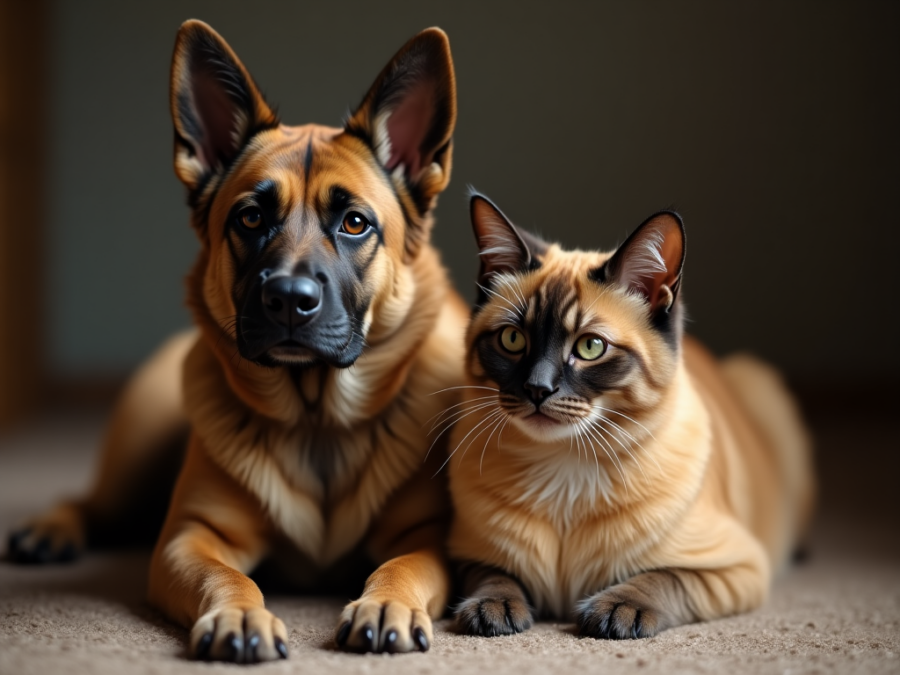An in-depth look at the most effective integrative and nutritional therapies for treating and preventing pancreatitis in dogs and cats.
Pancreatitis is becoming more common in the pet population. From a Western perspective, the primary cause is thought to be too much fat in the diet. Is it possible it goes deeper than that? This article looks at how pancreatitis in dogs and cats can be treated and prevented using an integrative approach, with emphasis on the importance of an evolutionary carnivorous diet.
Dogs and cats are designed to eat a carnivorous diet
In nature, both cats and dogs are carnivores.1 The anatomy of their temporal mandibular joints and musculature supports a carnivorous diet, as do the type and number of teeth. The gastrointestinal tracts of dogs and cats are also those of a carnivore.
As carnivores, cats and dogs are designed to eat the whole prey animal. Predigested and fermented carbohydrates, digestive enzymes and probiotics are all found in the entrails of a kill. Carnivores also eat all the organs, including the pancreas and gallbladder, which helps them digest the rest of the animal. The gut microbiome of a wild carnivore is very healthy, and not sterile as it would be on processed food, which means their guts are much better at digesting all proteins and fats. Wild canines will bury bones and allow them to ferment in the soil to eat later. Yet they do not get ill.
This is how a predator is designed to eat. They will hunt for days without eating, and then binge. They will eat whatever is available. Carnivores eat the whole animal and then fast again for days as they hunt. They are slim. Their digestive systems have a break to finish digesting before their next meal. Even though predators do binge eat, and are gluttonous at the time of a kill, they do not do this twice a day every 12 hours apart.
The importance of fasting in carnivores
Fasting is a normal part of the carnivore diet. Proteins and fats take a bit longer to digest, so ideally pets should not be fed every day even if they think they should. What we see as hunger is hunting behavior. In nature, carnivores return to where they last found food. This is smart — and predators have to be smart to find food.
Begging is a form of hunting and most domesticated pets use it to their advantage. The cat that wakes you at 3am and gets fed, will wake you again at 3am to be fed. The dog that runs to the bowl or barks for food is hunting. Make it harder for them. One study shows that hunting stimulates digestive enzymes and prepares the carnivore to digest their food. Play games with your pets. Take them for a walk before they eat and again afterwards. Break your habit of feeding them when they “ask for it.” In nature, food does not show up on a schedule.
Feed them once a day instead of twice. Mornings are best as predators would hunt in the morning then rest until the next hunt. If your pet stops eating, they might be self-imposing a fast. With obese dogs, I will often feed bone broth only for five to ten days to jumpstart their metabolism to lose weight.
Fasting and cats
For cats, fasting for 24 hours is as long as I will go. Otherwise, if they lose weight too fast, they develop hepatic lipidosis. I will slowly convert them to an evolutionary-appropriate diet over one to three months. Portion control and 24-hour fasting once a week will significantly decrease weight in cats. I do warn guardians that if their cats go on a hunger strike, to let them have the food they like and go back to mixing in the new food even more slowly. Cats are more prone to getting addicted to the post-carbohydrate endorphin release.

Pancreatitis and the evolutionary diet – a TCM perspective
A true holistic approach to pancreatitis is feeding pets their evolutionary diet, repairing their microbiome, and feeding supplements that make up for the lacking parts of a whole animal, such as ferments. If a pet has pancreatitis, TCM diagnosis is usually Stomach Heat with Spleen Qi deficiency. Stomach heat in TCM terms means food in the stomach is not digesting; instead, it is heating up and fermenting. Stomach Heat creates extreme hunger, halitosis and even dental disease.
Spleen Qi deficiency is a lack of overall digestive, absorptive and cellular respiration ability. Knowing the TCM pattern tells us to fix the gut and stop giving food that is difficult to digest. Dry food, regardless of what it is made with, is very Hot food and taxing on the gut. Mixing dry food with canned or raw food makes it impossible for either to be digested and does not increase the nutritional complement. Dry food and other commercial non-fresh foods usually contain rancid fats or vegetable-based fats that make them very difficult to digest.
Restricting fat in carnivores can be detrimental to many repair mechanisms. Add bile to the diet to help digest fats. Add apple cider vinegar to increase acid in the stomach to help digest proteins, especially if the pet is on acid blockers or protein pump inhibitors. Give dogs and cats food they were meant to digest.


Good vs. bad fats for carnivores
Not all fats should be avoided – only the bad fats. Carnivores must have animal fat in the form of linolinic acid. Low fat and vegan diets will not offer good fats. Do not feed super lean meats only, as they will not contain the needed fats.
Adding cow bile, not just digestive enzymes, is crucial to digesting and breaking down fats and allowing good absorption. In the TCM world, both chicken and lamb are Hotter foods, so avoid them. Turkey on its own will not have enough fat and neither will fit. So grass-fed beef or bison should be part of the diet. Avoid all vegetable-based fats as they cannot be broken down well and tend to go rancid in commercial foods.
Treating pancreatitis
Treatment during pancreatitis should include IV fluids, NPO and antibiotics, as this condition could lead to death. We should also include topical castor oil compresses over the liver and pancreas using biologically active essential oils of peppermint, coriander and ginger (five drops of each into every 10ml of castor oil — use organic cotton sheets to make the compress).
Place the compress on the area and then wrap the pet in a compression shirt to hold the compress in place for ten to 30 minutes. Do not let the pet lick the oil afterwards; it has pulled out toxins and should not be ingested. Bathe the pet in a chemical-free soap to remove the oil.
Do this two times a day for the first three days, then weekly for two to three months to clear the inflammatory reaction in the abdomen. When the pet is able to take in food, it should be bland and Cooling in TCM nature. Rabbit blended with sprouted quinoa is a good choice.
At this point, oral essential oils that are biologically active and labeled as safe for ingestion may be used. Culinary oils are best, like ginger, peppermint, spearmint, coriander, fenugreek, cumin, etc. Dilute these in coconut oil (which is Cooling) to 25% and rub one or two drops per 25 lbs of body weight on the gums twice a day to settle the digestive system.
From a TCM perspective, fats are not the villains when it comes to pancreatitis in dogs and cats. Feeding a carnivorous evolutionary diet, along with implementing the integrative modalities and therapies outlined in this article, can be an effective way to help treat and prevent this increasingly common disease.
____________________________________________________________
1Brandt, Nancy, Evolutionary Feeding of Pets, 2017. www.safe4animals.com







